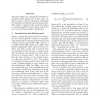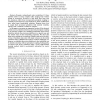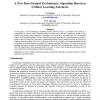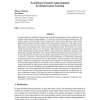584 search results - page 59 / 117 » Reinforcement Learning Task Clustering |
81
Voted
COLING
2000
15 years 3 months ago
2000
The paper illustrates a linguistic knowledge acquisition model making use of data types, innite memory, and an inferential mechanism for inducing new information from known data. ...
113
click to vote
IROS
2008
IEEE
15 years 8 months ago
2008
IEEE
—Dynamic system-based motor primitives [1] have enabled robots to learn complex tasks ranging from Tennisswings to locomotion. However, to date there have been only few extension...
143
Voted
IJHIS
2006
15 years 2 months ago
2006
In this paper, a new evolutionary computing model, called CLA-EC, is proposed. This model is a combination of a model called cellular learning automata (CLA) and the evolutionary ...
128
click to vote
CORR
2010
Springer
15 years 2 months ago
2010
Springer
Temporal difference methods are theoretically grounded and empirically effective methods for addressing reinforcement learning problems. In most real-world reinforcement learning ...
142
Voted
CVPR
2008
IEEE
16 years 4 months ago
2008
IEEE
Clustering is a fundamental task in many vision applications. To date, most clustering algorithms work in a batch setting and training examples must be gathered in a large group b...




